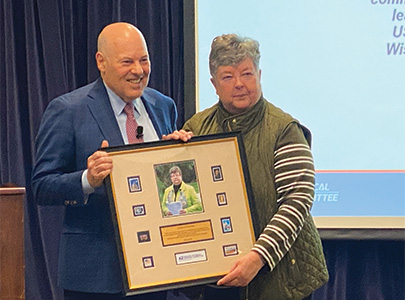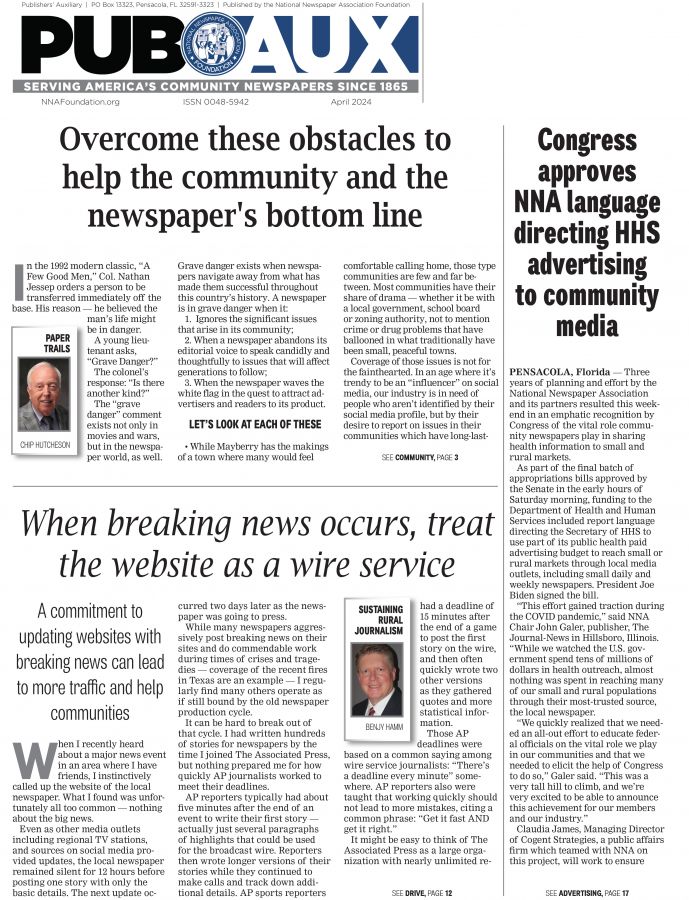University helps with sale of weekly paper in KS
Jan 14, 2015
Rural Kansas publishers ready to retire, but with no prospective buyers on the horizons, could have a better way to transition into retirement with the help of a program started by the University of Kansas School of Business.
By Stanley Schwartz
Managing Editor | Publishers’ Auxiliary
LAWRENCE, KS—Rural Kansas publishers ready to retire, but with no prospective buyers on the horizons, could have a better way to transition into retirement with the help of a program started by the University of Kansas School of Business.
In his late 60s and with no succession plan, former owner of the Hillsboro (KS) Free Press, Joel Klaassen, said he began to worry about what would happen to the newspaper he started, to his staff and to the community the weekly served.
“That’s when I remembered reading something in my alumnus magazine about a program in the KU School of Business,” he said.
That program, Red Tire, was started as a way to give students real-world experience in putting together entrepreneurial business deals. Red Tire Director Wally Meyer, who teaches some of the entrepreneurial courses at KU, said he saw that there was a need for rural, mid- and small-sized business owners, who wanted to retire but had no buyer or direct plan for transitioning out of their companies, a reasonable alternative.
“In urban areas,” he noted, “there is a higher percentage of opportunities for a small business to find a new owner.” Out in rural areas, however, that may not be the case. Owners of small businesses who are ready to retire but cannot find a buyer would face the possibility of just closing the company they may have spent a lifetime building. It could have a severe impact on the community where the business is located, its employees and how the owner would be able to spend his or her retirement years.
Meyer said the idea he helped develop in 2012 was to put KU alumni together with fairly recent KU graduates looking to run their own businesses.
Red Tire was born from that idea. Meyer said it would make it easier for business owners to redefine their retirement.
“Our situation was a little different,” said Joey Young, the new majority owner of the Free Press. At lunch meetings he had approached Klaassen a few years ago as a first-time newspaper owner to learn more about the newspaper business. Young is not a KU grad, but the new program worked just the same.
Those lunch meetings put the idea into Klaassen’s head that Young might be a worthy successor for the Free Press. Klaassen said he contacted Red Tire and said that he already had someone in mind to take over the paper.
“They took it from there,” he said.
Meyer, who noted that more than 100 companies have signed up for the program, said normally they use various types of advertising, including newspaper ads, to find owners and buyers to bring together for a successful sale. So far, they have made two successful business transitions—the newspaper and a veterinarian business. Currently, there are three more deals in the works.
The program, which is free to the companies that use it, helps sellers and buyers find a fair price for the business. Meyer said the system is set up so that Red Tire does not favor one side over the other.
“They don’t get paid for what they do,” Klaassen said, “so they have no stake in the sale.”
Young said the program made the sale seem simple and easy. He already owned The Clarion, a weekly paper that serves Andale, Colwich, Haven, Maize, Mount Hope, Partridge and Yoder, KS. He said he was only thinking about expanding when Klaassen approached him about using Red Tire to foster the sale.
So far, Red Tire has only operated within Kansas, but Meyer said it would expand because there are alumni living beyond the state’s border. He also noted that KU is helping other universities develop similar programs for their students.
The best candidates for buying a company, Meyer said, are the graduates who have been out in the business world between five and 10 years, who truly want to be their own boss.
And to make sure the transition goes as smoothly as possible, he said retiring owners are required to stay on at the business for at least a year.
Klaassen said he agreed to stay on as an employee for three years, with Young having the option to end that contract at the end of each year, if he chooses. He had a minority owner in the paper who decided to stay on and continue as a minority owner with Young.
“It’s odd being an employee here,” he said. It took a while for the staff to stop asking him what to do and to start asking Young. “Now,” he added, “I’m glad I don’t have to make those kinds of decisions anymore.”
Young said he’s grateful that Klaassen is around for the transition. It helps having someone there who knows how the business is supposed to run.














